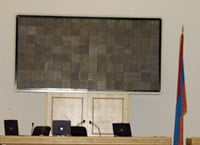This year marks the first year that the Armenian parliament is actually discussing serious political issues concerning Armenia. One of the issues is whether Armenia should adopt a system of a full minority basis for elections or go along with the current system, according to which 56 MPs are elected based on a majority. The issue really concerns politics, but the problem is the fact that parliamentary parties take into account their own partial interests (sometimes the interests of their groups) first but not the interest of the state.
What is this issue really about? The problem is that if we adopt a system of full minority basis elections, parties will be given more important roles because the current MPs and oligarchs will have to join political parties in order to get elected. Accordingly parties will ask money for including those names in their lists and thus solve their financial problems that way. However, this is one side of the story (not the most important one for right now).
The problem is that it is more beneficial for the authorities to have a 100% minority basis election system. In order to understand this we just have to recall the fact that Armenia has not had democratic elections for a long time. Elections go through four main phases in Armenia. 1. The elite of the authorities negotiate and come to a decision as to who will be elected. 2. On election days, they do everything they can to reach the proposed result based on the abovementioned result, and later, at night after the elections, electoral commissions make corrections. 3. During the next several days, the most active participants of oppositional rallies are arrested. 4. Parallel to this process, lobbying is also conducted with the purpose of assuring the international community and organizations that the elections were fair so that they don’t publish critical reports and estimations about the fraudulence that has taken place. This is the whole process that goes on during elections. It is evident that it will be easier to conduct this process if Armenia adopts a full minority basis system. The administrative criminal groups will not have to “work for two goals”, thus trying to violate both majority and minority basis elections in precincts and electoral commissions will not have to make dual calculations and check numbers twice. In other words, the results are violated immediately and at once. Besides that, there are no more surprises. In other words, powerful oppositionists will not have an opportunity to work at any precinct and appear in the parliament (For instance, like Smbat Aivazyan did).
Besides that, it will be easier for the president to control the situation too. For instance, theoretically an oppositional party may have 30% of places on a minority basis, but take all the places in the parliament on majority basis and have majority in the parliament. Notwithstanding, that is impossible even in the case of having a 100% minority basis election system. In other words, from the very beginning the authorities will know which parties may collect certain number of votes.
It is strange, but the opposition is also interested in the 100% minority basis election system. In this case they have an opportunity to have extra mandates. For instance, if those parties currently collect 10% and are given 8-9 places, after amending the law they will be given 14-15 places. If we take into account the fact that they will not let any oppositionists win elections on majority basis it is clear that they will not make any compromises for this.
Theoretically, only republicans may be against adopting a 100% minority basis election system because they have “privatized” precincts in the country already. Hardly the efforts of this part of the political field may be successful. At least, some of them have already “insured their security” by joining a party that will disband sooner or later. Does it make a difference if the money to be spent is the same and if the result is the same?
In a word, after changing the electoral procedures, it is rare to see a change in the way the parliament works. However, the number of asphalting n the communities may reduce. Asphalting roads for yourself is one thing, and asphalting roads “in favor of the reputation of your party” is another thing.

